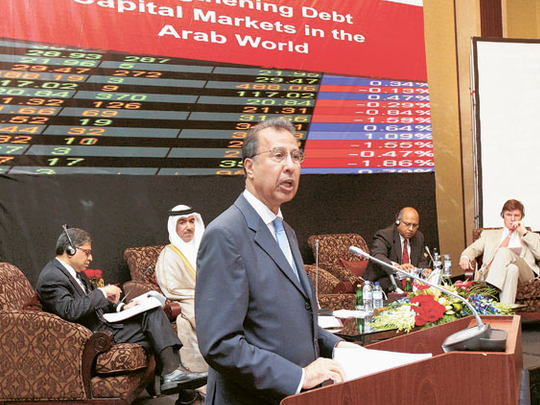
Abu Dhabi: The Arab states must develop their bond markets by issuing laws to encourage transactions in bonds, UAE Central Bank Governor Sultan Bin Nasser Al Suwaidi said here yesterday in a speech read out by Saif Al Shamsi, assistant governor for monetary policy and financial stability.
"Arab states have been developing their financial markets, but the public bonds have remained limited in the Arab market, though they are important. There's a need that the government bonds should constitute at least 15 per cent to 25 per cent of the GDP [gross domestic product]," Al Suwaidi said at a seminar titled ‘Strengthening the Debt Capital Markets in the Arab World' organised by the Arab Monetary Fund, International Monetary Fund, World Bank Group and European Bank for Reconstruction and Development.
He said in the UAE the issuance of bonds has been limited to a few local governments.
"Until now, we don't have a federal bond market in the UAE dirham. This has deprived the country from the so-called yield curve, which helps to determine the interest rate on company bonds," Al Suwaidi added.
He said the reason for not issuing these bonds in the UAE is that it enjoys good revenues and returns that cover its total public expenditure.
The UAE Central Bank also said it's calling for the creation of a centralised Sharia board to facilitate the sale of Islamic bonds.
"Despite the advanced situation of the UAE in the field of issuing sukuk, we think more needs to be done. That includes finding a unified authority for legal fatwas on the national level, similar to Malaysia," Al Suwaidi said.
"Law 685 provides for having a federal Sharia board, all we are doing is calling for its establishment so that the government has the option of issuing Islamic bonds," Al Shamsi told reporters on the sidelines of the seminar.
Speaking at the event, Dr Jasem Al Mannai, director general and chairman of the board of the Arab Monetary Fund, said "Strengthening local debt capital markets would prepare the ground for a regional market that will be beneficial to all counties in the region."
Assistant director of the monetary and capital markets department at the International Monetary Fund (IMF) Udaibir S. Das said as the Middle East and North Africa (Mena) region makes a historic transition and reform, it also confronts a much tougher external environment.
"Financing conditions are tighter, and several parts of capital markets, some market intermediaries central to bond markets and the investor base have been fundamentally disrupted," said Das.
He added: "While there is willingness from the international community, bilateral and private sector to help and work with the region, much of the economic transition will have to be financed through domestic resources and using public and private balance sheets."












